#aziraphale meta
Text
fr tho i understand why crowley wants them to run away together and run from all of it but he just seems to have forgotten that aziraphale does not cower, he doesn't back down, and he. does. not. run.
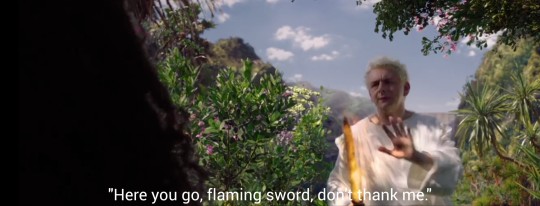
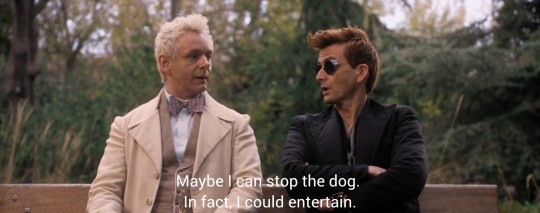


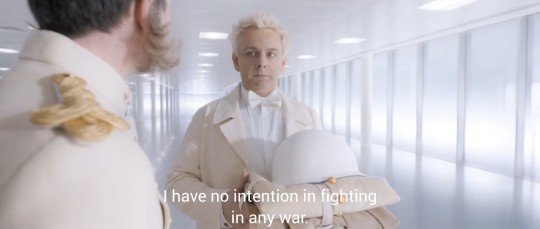
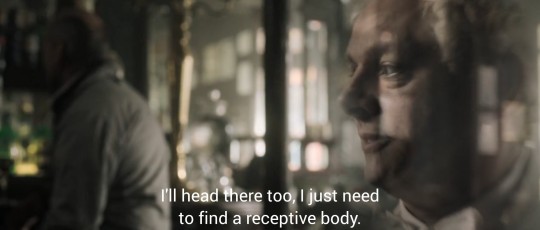
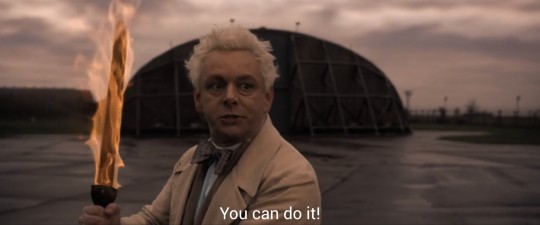

and honestly, crowley knows it:

#like yes aziraphale is naive and jittery and anxious about it#but he DOES. NOT. RUN#fucking fights to the last man the legend that he is#theres a reason the demon handbook says to avoid him and describes him as a demon smiter#man is NAILS given half a chance#good omens#just pure aziraphale appreciations here im sorry#aziraphale meta#s1 meta
8K notes
·
View notes
Text
Aziraphale sees Crowley standing next to his their car and he hesitates; this is his last chance, the last possible moment to change his mind about leaving.

Do you think he feels the sunshine on his hands, against his stomach, and remembers how warm Crowley had been in his arms? How warm he had felt beneath his palms even through several layers of fabric?
How for the first time in his existence his body had felt complete, like there was no longer something— someone missing?
Do you think he sees him standing in the sun, all shining fire-red and hidden golden eyes, and regrets not sliding his hand to the back of his neck, up into his hair? Do you think he regrets not taking the chance to feel it silken soft and familiar between his fingers?
Do you think he remembers all the times they enjoyed a warm, sunny day together and the way the star seems to remember that Crowley had put its siblings into the sky? Do you think he remembers rays of sunlight caressing his cheekbones and wishes it had been his fingertips instead?
'Anything you need?' the Metatron asks him, and he is still looking at Crowley with the sun on his skin.
I need you, he thinks, and even though his eyes are hidden away, he knows Crowley is looking at him.

Do you think Aziraphale remembers the kiss, remembers the love he could taste on his tongue, the six millennia of do that, please, kiss me, the slow, painful minute of do that again, please, right now?
(The realization that he won't.)
He almost stays. Almost. But the Metatron is already walking away, and he looks at Crowley again, looks past sunset conversations and sunrise breakfasts and the heart-shaped star in Crowley's chest, and feels his pain.
(Their pain.)
Do you think that's why he leaves anyway? Not just because heaven needs fixing but because all that pain, all the hurt they caused each other, can't have been for nothing?
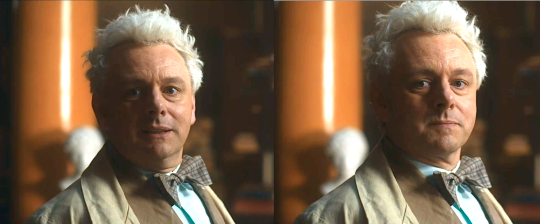
I can't leave him— no, I don't want to leave him.
No.
No, I want to go back to him.
Do you think he takes his anger and holds onto it until it burns his palm because it is easier to be angry at Crowley, at himself, than to think about everything they just took from each other? Everything they just lost?
Everything they could have been?
Aziraphale takes the memory of sunshine on his skin (Crowley's lips on his) and locks it away in a golden cage made out of faith; faith that Crowley will be there when he comes back.
Once he does (because he will, he will, he has to), there will be sunshine and warmth and Crowley, and they will finally be able to love each other with the sun and the whole universe as their witness.
No more shadows or shades of grey. Just the two of them in the light where they belong.
#alex writes good omens#good omens#ineffable husbands#crowley#aziraphale#good omens season 2#go2#aziracrow#crowley x aziraphale#ineffable divorce#the final fifteen#good omens kiss#aziraphale meta#fuck the metatron#idk what to call this flavour of post#character analysis and ficlet in one with some heartbreaking screenshots#see this is what happens when i watch the kiss scene frame by frame
948 notes
·
View notes
Text
A Wartime Footing: An Explanation for Aziraphale's Elevator Smile
(Based on an ask from @sabotage-on-mercury in response to my meta on why Aziraphale had to go to Heaven)
The creepy smile was one part of the ending I couldn't quite put my finger on either, until someone pointed out on a Twitter response to my meta:
The reason why its scary is bc azi is becoming properly angry at the system and is 101% determined to set things right (Source)
In season 1, Aziraphale was determined not to kill anyone to stop the Apocalypse. He wouldn't even tell Crowley where the Antichrist was, because Crowley's only solution was to kill him.
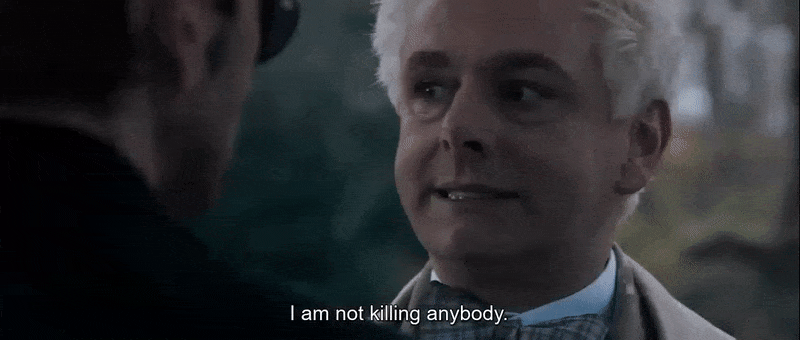
And because Crowley consistently didn't have any ideas ("not one single better idea??"), Aziraphale took it on himself to pursue the only option left––to ask God to intervene and stop both Heaven and Hell from destroying Earth. Therefore, Aziraphale had to keep the integrity of his angel status by distancing himself from Crowley, while the world was still in danger.
Despite this dedication avoid bloodshed, when God didn't have an answer, Aziraphale went against one of his core beliefs to help save the world. He was willing to murder a child.
For Aziraphale, that takes guts. And (seeing how he reacted at the end of the Job minisode), I wonder that if he had killed Adam Young, Aziraphale would have checked himself into Hell.
Going to Heaven for Aziraphale is ultimately a conscious choice, one that he is clearly afraid of. We see him constantly steeling himself again the Metatron in the end, covering his fear and hurt from losing Crowley with a placid smile and a flippant attitude. He's wearing so many masks, to Crowley, to himself, to the Metatron...
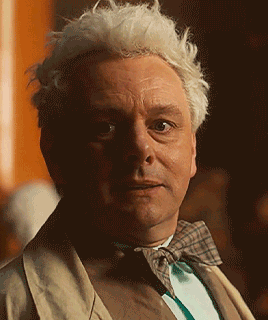
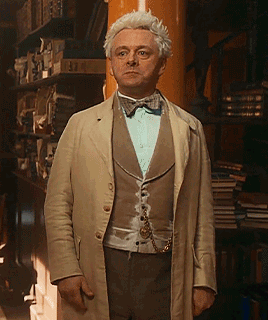
All season we've seen him playing roles (detective, magician, doctor, landlord). But the final role is warrior. Going up that elevator, we first see Aziraphale's eyes searching, worried, panicking, but unable to show it because he's not in a safe space. He swallows, blinks, he's breathing hard (you can see his entire shoulders rise and fall).
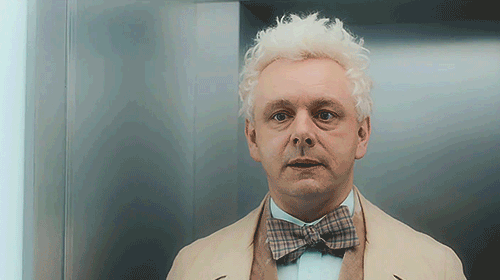
But as he goes up, his expression steels. He's quite literally putting on a mask (to himself): a vengeful, hardened expression of pure anger and rage (to drown out the fear and uncertainty he so clearly still has).
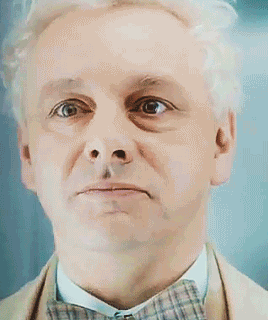

Michael Sheen conveying contained anger in both Good Omens and Masters of Sex.
Cuz this isn't just him scrambling to kill a kid, this is him walking calmly and knowingly into sacrificing everything he loves most (Crowley, the bookshop, his entire life on earth) to create a world that will always be safe for him and Crowley and humanity for the rest of time. Where he would have to go up against the most powerful angels, the Metatron, and God Themself to change things. He can't be the kind, sweet angel he was on Earth. That won't cut it in Heaven if he wants to make a difference in any real way.
He wanted to do it with Crowley, with the love and support and strength of his demon. But without him, Aziraphale has to channel something else to keep his resolve afloat.
Something he had when he was a warrior, fighting on the front lines of a battle between Heaven and Hell, when he very likely led a platoon into divine fields of bloodshed before the earth was born. When he was an avenging angel.
I haven’t done this since the Great War.
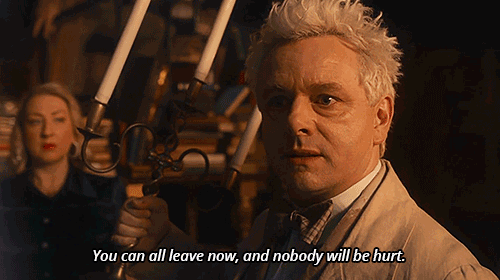
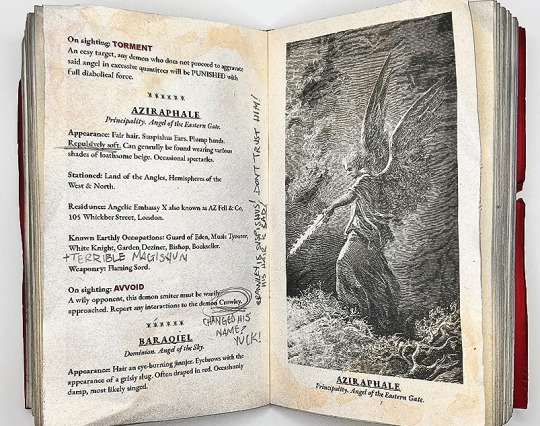
It was a time and an identity he had chosen to leave behind, because it wasn't the kind of angel he was anymore ("I'm not fighting in any war!"). In this context, you can read Aziraphale's passionate unwillingness to take a life (his pacifism) directly into his past experience as a warrior. It is often the veterans of terrible wars who are the most earnest advocates for peace. (And especially in Britain and Europe, where the violence of the world wars is still such a powerful and painful national memory.)
As he goes up the elevator, he's breathing so hard we can hear it mirrored in the soundtrack, and he is so hyperfocused on steeling himself that he doesn't even care that the Metatron is watching him. He doesn't rest until he's psyched himself into that warrior mindset necessary to carry out this mission entirely by himself, to be both the moral advocate and the uncompromising leader of angels who had intimidated him his entire life. To demand respect and to talk to the very face of God and tell Them they are Wrong.
(Please read this Neil-approved meta for further thoughts on God and Aziraphale.)
That creepy smile is clearly not there because Aziraphale is happy to fall into a toxic parent's false love. There's no comfort or wistful nostalgia in that face. There's no "it'll be so much nicer" in that smile. It's not a happy smile. It's an I'm-gonna-fuck-shit-up smile.
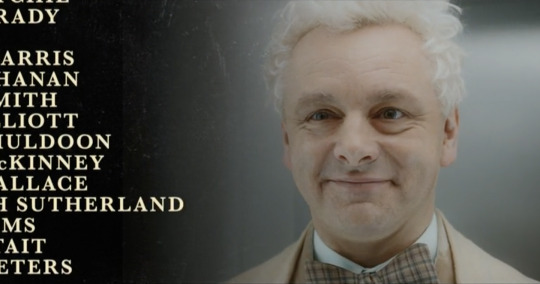
Because it's a warrior's smile before they go into battle, before they put on that armor and, for a while, become something they're not in the name of some greater good. He's fucking furious and it's downright frightening.
Because I have no doubt that the angel Aziraphale we get in Season 3 is the angel Aziraphale who can say this:
He's not quite there yet in the TV show. But this bravery, this anger, this flaming rage is how it starts.
Or as he's described in the book when Aziraphale mysteriously does away with the local mafia:
Just because you’re an angel doesn’t mean you have to be a fool.
#good omens#good omens 2#aziraphale#aziraphale meta#aziraphale defense squad#ineffable husbands#good omens meta#go s2 meta#go meta#go s2#michael sheen#book!aziraphale#*mine#*mymeta#made this a separate post cuz i dunno which version is better for reblogs#the side-by-side gifs kept crashing on me 😑#anyway I love and adore defending our angel#but in no way am I taking sides#I'm just coming to his aid since he's getting so much flack rn
1K notes
·
View notes
Text
I am rewatching ep 6 again and I’m noticing this time how the forced smile slips off of Aziraphale’s face as soon as he is out of Metatron’s line of sight. How anxious his eyes are.
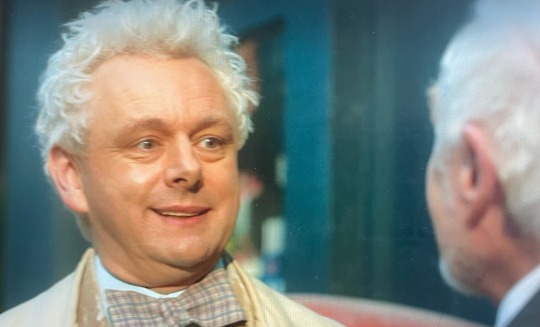

He has to compose himself when he walks into the bookshop. He takes a few deep, fortifying breaths, not unlike the ones Crowley has to take a few minutes later as he gathers his thoughts and tries to put words to six thousand years of feelings.

Aziraphale says “I have excellent news,” but he knows. He knows Crowley is going to try to say no. He knows what the stakes are. He’s offering himself just as much as he is offering Crowley Heaven. Aziraphale is not an idiot. He knows that Crowley is going to hear “Heaven” and want to run. He knows this is not what Crowley wants or believes in. He just hopes that the promise of being together--of being with him--might be enough.
526 notes
·
View notes
Text
Apply this to Aziraphale how you will, but as an autistic person, I REALLY fell for Metatron's kind old man act. I didn't notice the subtle manipulation, like giving Aziraphale coffee and saying "I've ingested things in my time" to show that he's different from the food-hating, earth-hating angels. I didn't notice him taking on Aziraphale's speech mannerisms before turning away and scowling. It was only after reading meta and rewatching twice that I was like WOAH I didn't even see that.
I can see that heaven's system is screwed up, but I literally thought "Metatron's not like the other angels." I trusted his kindness, especially given that he wanted Aziraphale to run heaven, obviously the best angel for the job. I didn't consider that he wanted to appoint him because he knows Aziraphale is powerful and has stopped heaven and hell before.
I was right along with Aziraphale when all of this went down, agreeing with him when he didn't want the job ("where would I get my coffee?") and then seeing the appeal when Metatron said he could run heaven from earth WITH Crowley. They get to keep living the life they carved out for each other AND Aziraphale can fix the corruption in heaven? I love seeing kind-hearted characters fixing broken things, and I wanted him to fix the system.
As for Crowley becoming an angel again, I didn't really think of it as changing him. He's just Crowley, and he'd keep being Crowley. He's good already. I saw it as heaven offering to right their wrong because he never deserved to fall in the first place, and they wouldn't let someone they believed is evil back in, right? I trusted their judgment of Aziraphale and Crowley. I didn't consider that of COURSE Crowley wouldn't want to go back there. Why would he??
So when Aziraphale finally told him about the offer, I was hoping he would agree. It's important, they could change things! Metatron is claiming to give Aziraphale the reins. Crowley and Aziraphale for once are allowed to be together, and Aziraphale was so ready to not hold back in their relationship. There'd be no reason to deny it or go slow, it's obvious that their love is mutual.
It wasn't a surprise that Crowley said no, and deep down, Aziraphale knew why, but he didn't understand. Crowley and Aziraphale weren't seeing how the other saw it (that Aziraphale WANTS to be together. He wants to make heaven a better place, but Crowley believes it'll never happen, and heaven means to manipulate him). They truly would be the perfect team if they were in charge.
But the problem: that's not what Metatron or heaven intends. "Give me coffee or give me death" meant that if Aziraphale didn't accept the offer, he would've been destroyed. Metatron knew he'd accept, and based on the glare he gave Crowley, I don't think Crowley was ever really in his plan. Metatron will try to use Aziraphale and his power to end the world, and he has no idea he's a pawn. He fell for Metatron's apparent kindness and got swept away with the idea that he and Crowley wouldn't have to hide.
It's heartbreaking because I AM frustrated with Aziraphale, but I know why he chose heaven. There's trauma underlying his actions as well, and he didn't need MAGIC coffee (sorry, I'm mean about coffee theory) to fall hook, line, and sinker for what Metatron was selling. He loves Crowley so much, but if his plans to change heaven worked, he'd be saving the entire world from destruction.
People are still like "NO NO NO, how could he leave Crowley? He must've been hypnotized" when he is putting the WORLD first. That's not to say he won't regret it immediately, miss Crowley the entire time, or even change his mind, but it all happened so fast, and Crowley seemingly gave out on him. He refused, said "good luck", and started to leave. They didn't communicate with each other. I don't think Aziraphale was leaving him forever, but he thought "I HAVE to do this". Crowley is right, but Aziraphale can't see it another way.
Now he has to try his best to change heaven. In the end, he'll see the mistake he made and owe an apology to Crowley, but he has to figure it out on his own. After it's all said and done, it could be the last time they hold back from each other. Going through an angst arc of THIS magnitude would be worth it, and Neil Gaiman is a genius
#aziraphale apologist#good omens meta#autistic aziraphale#good omens#ineffable husbands#crowley#good omens season 2#aziraphale#aziracrow#good omens spoilers#metatron good omens#coffee theory#Aziraphale meta#good omens theory#good omens finale#aziraphale kin
285 notes
·
View notes
Text
Aziraphale and Trauma
[Just a note that I initially wrote this in response to this post: https://www.tumblr.com/theangelyouknew/732357015604756480?source=share&ref=_tumblr which is full of insightful info. I'm reposting my response here with some minor edits so it's easier to find in tags.]
This is something I actually find interesting within the fandom, because there seems to be this weird divide in fandom when it comes to Aziraphale.
See, I love Aziraphale. I think he's an amazing and well nuanced character, but a lot of the time fandom boils him down into this really simple version of himself. This happens both with people who dislike him and claim he's a bad person as well as with those who want to soften him up and make him more palatable. Aziraphale isn't the only one who has trouble with black and white thinking here!
Things like Coffee Theory remove Aziraphale's agency because the thought of Aziraphale doing something to hurt Crowley deliberately is something they can't stomach. If Aziraphale is acting under some kind of major magical influence, it means that it's possible to brush over the fact that he can - and has - hurt Crowley in the past and it certainly hasn't always been accidental.
There's a lot of Psychology I could touch on here, but it's honestly such a complicated topic that I don't really feel I can do it justice attached to a completely different topic.
But one thing I do want to touch on a bit is how Aziraphale asserts control in his own life via his connection with Crowley, and that touches on something equally complicated, which is something that's probably hard to understand.
Abuse victims are often manipulative.
I don't mean this at all as some kind of slight or insult. I've been an abuse victim myself and it's one reason I know it's true.
Fandom talks a lot about Crowley's trauma and he's got loads, to be sure. I think of that meme about "this bad boy can fit a lot of trauma" and it's very true. I've even seen people mention that Aziraphale has a different kind of Trauma than Crowley, which is also true.
What I haven't seen is someone addressing that the type of religious trauma is a form of CPTSD. CPTSD or "Complex PTSD" is a very specific form of PTSD. PTSD is characterized as being the result of a traumatic event - Crowley's fall, for example, is a good example of PTSD and I can go into that at some point. CPTSD is different because it's not a singular event, it's the result of being in a constant high stress situation. A lot of abuse victims - especially those abused by parental figures or significant others - have this form of PTSD.
A good way to see the difference is in comparing how they relate to their trauma. When Crowley thinks he's lost Aziraphale in S1, it sends him into a spiral. But importantly we see that this traumatic event is causing Crowley to go back to another traumatic event in time, triggering his memories of his fall. This emphasizes how much Crowley's fall defines his trauma. We rarely see him experiencing trauma at the hands of Hell, as he's mostly allowed freedom to handle his job on earth the way he wants.
https://cptsdfoundation.org/ defines CPTSD as "the results of ongoing, inescapable, relational trauma. Unlike Post-Traumatic Stress Disorder (PTSD), Complex PTSD typically involves being hurt by another person. These hurts are ongoing, repeated, and often involving a betrayal and loss of safety."
In humans, this is caused by having no sense of safety in key moments of development. It strips away sense of self, sense of worth and really any agency. We even see the angels using direct gaslighting tactics on Aziraphale in S2, which I'm surprised doesn't get mentioned more often: When they come to the bookshop looking for Gabriel, they mention Gabriel and then almost immediately when Aziraphale asks "you were looking for Gabriel", Uriel outright says a line that goes something like "Did we say we were looking for Gabriel?", leading Aziraphale to fumble and try to remember if they did, in fact, say that at some point (they did).
So, one big thing to know about CPTSD and this kind of abuse related trauma is that learning to lie and be manipulative is often what people have to do to survive. Children with abusive parents will learn how to be manipulative in order to get what they need or avoid losing things they need.
We see this with Aziraphale, time and time again. He could just ASK Crowley for things he wants. A lot of people point out that he could ask and that Crowley would probably give in to him most of the time anyway. But that's not how it works in an abusive home. Instead, Aziraphale maneuvers Crowley into situations where Crowley is forced to give him what he needs or wants.
His lack of agency, as a result of his CPTSD, is also why he needs to be worked into making decisions that he already knows - or at least suspects - are right. That's why they have their little dance every time Crowley has to talk Aziraphale into something by finding the right way to frame it so it makes sense with Aziraphale's strict rule structure. These rules exist as a defensive mechanism too. Having rules makes it easier to figure out how to avoid being hurt and Aziraphale cannot simply step outside the rules because it's Not Safe. Not even with someone he trusts as much as Crowley.
The entire apology dance scene stands out for a few reasons. Everything Aziraphale does in the entire scene is an act that allows him to take control of the situation. He's already won, so to speak, because Crowley is back and Crowley is going to do what he wants. The apology is unnecessary on every level.
This post talks about how uncomfortable Crowley has to be sharing a space with Gabriel. Gabriel is with the abusive team, whether or not he was directly involved with Crowley's fall. Crowley also harbors a severe distress and mistrust of Gabriel because of Gabriel's attempts to destroy Aziraphale, the most important person to Crowley. But it's worth noting that Aziraphale is uncomfortable too.
Another good indicator of how stressed Aziraphale is with all this is that he doesn't eat ANYTHING when Gabriel is in the shop. The only food he consumes in modern era is when he's in the Bentley which is a "safe" space. Gabriel constantly hounded Aziraphale over eating and despite offering Gabriel hot chocolate, we don't see him partaking himself. He does briefly drink to demonstrate how "drinking tea" works for Muriel, but he doesn't seem to drink from his cup at all after demonstrating.
The bookshop is also Aziraphale's safe space, his ONLY safe space - Crowley still technically has the Bentley, and honestly I feel like Aziraphale wanting to borrow the Bentley is actually partially because he needs to get away from Gabriel and the Bentley is the only place that feels safe for him at the moment. Shax ruins any illusion of safety for him, but Aziraphale is much more enthused for his trip in ep3 and a fair amount of it is because he's not trapped with Gabriel.
A small note here, as a thought occurs to me. Aziraphale asserting that the Bentley is "our car" is probably mostly for himself. He's trying to realign his thinking to make the Bentley an acceptable "safe space" for himself prior to the trip.
There is a very different relationship dynamic when it comes to Gabriel and Aziraphale because Gabriel is the constant source of Aziraphale's trauma. He's Aziraphale's superior, the one he has to report to, the one who passes down his missions and his punishments. When Aziraphale takes Gabriel in, he's just invited his former abuser of over 6000 years into his safe haven. This is a hugely uncomfortable thing for an abuse survivor.
Worst of all, because Jim is, for all intents and purposes, NOT Gabriel, Aziraphale can't bring himself to lash out at his former abuser the way he wants to.
That brings us back to this apology scene.
There are two major things going on here and both of them are bad and hurtful toward Crowley. They're also both intensely unfair. I love Aziraphale but this was definitely a dick move.
Firstly: Aziraphale is using Crowley to reassert a sense of control over the situation because he is spiraling. He can't assert control over his life and his shop, which is one thing that he falls back on heavily, and that leaves him scrambling to find somewhere where he can control his situation. He makes Crowley go through this whole unnecessary apology and dance routine because it makes him feel like he has control over SOMETHING in his life right now.
Secondly: Aziraphale is also enacting his own trauma on Crowley. He's treating Crowley the way Heaven treats him. This is a direct parallel to the way Crowley terrorizes his house plants because he can't do anything to the people who actually caused his trauma. This is, obviously, wildly unfair of Aziraphale to do - and I'm fairly sure there are other small moments where Aziraphale does this in a mild way, I'd have to rewatch again.
These are both behaviors common in CPTSD caused by environments that apply this constant state of stress.
I'm not going to say it's right, or that Aziraphale isn't being a bit of a bastard in this moment - he absolutely is - but this behavior does have some obvious triggers that might be easy to overlook. It's just important to understand that Aziraphale is falling into self-preservation habits that are actively detrimental to his relationship with Crowley. It's not just the manipulation, he's also hiding things and lying to Crowley when he really shouldn't be - both things often necessary in abusive environments - but he's doing it because that's the method that he's created that works with his abusive relationship in Heaven and he's falling back on it because he feels unsafe. The trouble is, this survival tactic does not work with Crowley and actively makes things worse because it shuts down open communication entirely.
#Aziraphale#Good Omens#Good Omens Meta#good omens s2#aziraphale meta#crowley x arizaphale#CPTSD discussion
399 notes
·
View notes
Text
"Got Any Better Ideas?" Aziraphale's Conviction and Crowley's Resignation
I was watching that scene in 1x06 again, and something clicked for me that never any sense to me before. In fact, it explained a couple things in season 2 .
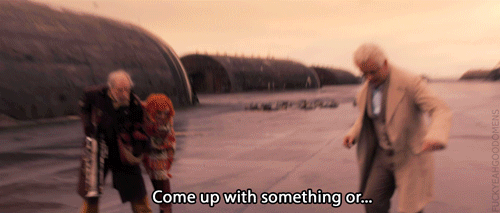
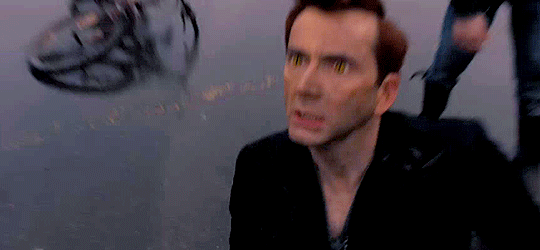
See this scene is beautiful, heartbreaking, and hilarious all in one. We see yet another example of how much Crowley cares about Aziraphale... And we see Aziraphale making a bizarre move to (?) attack Crowley, then make a childish threat that won't matter given that they're both about die.
Before, I just assumed that he was just saying whatever thought ran through his head.
Now I get it.
Recap: Crowley realized that Gabriel and Beelzebub told on them Satan. Satan, who was now coming to kill them all. Crowley was this close to giving up, and then Aziraphale picked up his sword.
There's only one reason why: Aziraphale wasn't going to give up. In that moment, Aziraphale chose to fight Satan. He knew he would likely die trying.
(Psst! Past self: He's not giving Crowley some weird, friendship ultimatum!)
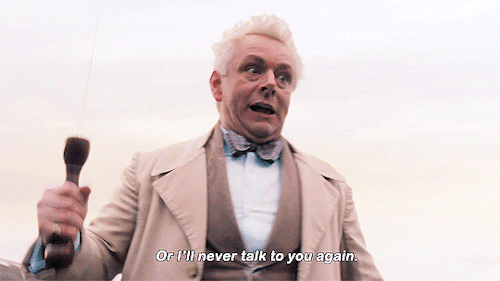
He's terrified. But resolved. And he knows this really will be their last conversation.

And Crowley gets it. He might not have believed that they were going to survive Satan's arrival, but he hadn't quite put together like this: If he isn't able to come up with another plan, Aziraphale will take up his sword against Satan and Crowley will have to watch him die.
So Crowley got a better idea, remembering Adam's power, he decided to give the human(s) the choice and protect it alongside Aziraphale.
Season 2
This is part of larger ongoing dynamic where (unless circumstances allow Crowley to give Aziraphale a better plan which actually addresses the problem) Aziraphale will act, like choosing to help Jim!Gabriel. If he thinks it's the right thing to do, he'll do it, regardless of the costs. It won't deter him at all.
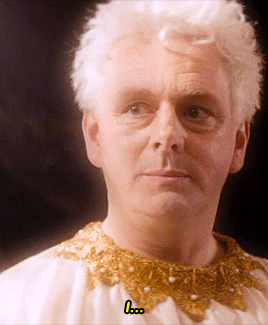
Crowley learned that about him some time ago.
He saw Aziraphale lie to save Lot's children despite fully expecting to go hell for it.

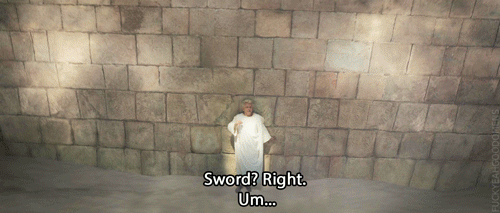
(Plus Aziraphale straight up lied to God about the flaming sword that time, right? UMM... Why didn't he fall????)

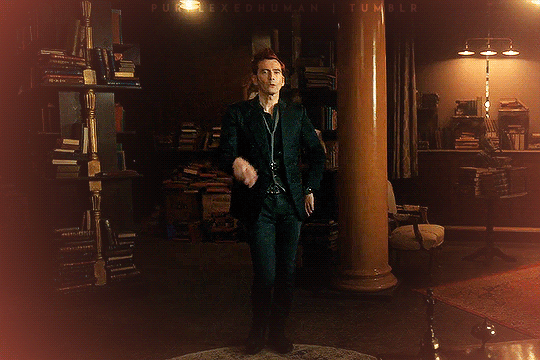
So there Crowley is, apologizing(?), dancing, and lying about the full extent of the danger they're in.
I don't agree with Crowley's actions, with the lying especially. (Seriously, Crowley? Tell Aziraphale about the Extreme Sanctions!!) But Crowley is resigned to help at this point because he knows Aziraphale will be in danger anyways and he knows that when Aziraphale has made his mind up, he won't change it. Crowley can only offer his help or provide a different solution.
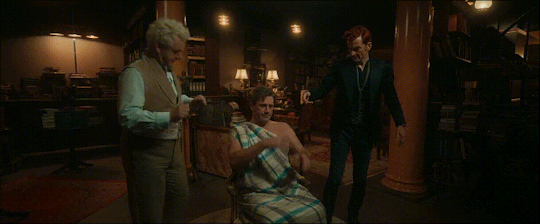
And since their communication problems are so big right now, their dynamic is to work around each other rather than with each other.
Right from the very beginning, their conception of the problem is very different.
Crowley: We're exposed to danger because of Gabriel, we have to find a way to hide Gabriel/ourselves from Heaven and Hell.
Aziraphale: Jim!Gabriel (innocent like Lot's children/rather childlike himself) is in danger, we have to find a way to hide Gabriel from Heaven and Hell.
TAKEAWAY
-Crowley wants them both to stay away from the toxic plans of Heaven/Hell so they can be safe together.
-Aziraphale wants to directly interfere with the plans of Heaven/Hell when he feels the responsibility to do good.
Takeaway on the ending of season 2:
When their perspective on the problem is so different to begin with, the breakup makes a little more sense to me. Though no less horrible.
(Wild Card: Heaven is the symbol of what is right and good? Aziraphale since when??? UGH, I have to meta more about this: Aziraphale's (and Crowley's) belief in the ineffable plan and how it affects his idea of reform/fixing the institutional problem of Heaven.)
#good omens#good omens meta#aziraphale#crowley#aziracrow#ineffable husbands#aziraphale defense squad#aziraphale meta
401 notes
·
View notes
Text
Feeling angsty about the Angel again…
Aziraphale was horrified to give Crowley holy water. He wouldn’t hear of it, he was terrified at the thought of Crowley using it. He didn’t want to give Crowley “a suicide pill,” in his own words.
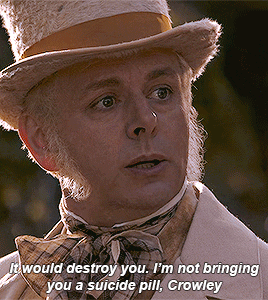
He was always terrified what Hell would do to Crowley throughout history. If Hell found out they’d been consorting and fraternizing…“They’ll destroy you.”
He was holding onto Crowley in Edinburg, totally and hopelessly in love having watched Crowley display more kindness and compassion and self-sacrifice than any angels Aziraphale knows, when Hell quite literally ripped him out of his arms.
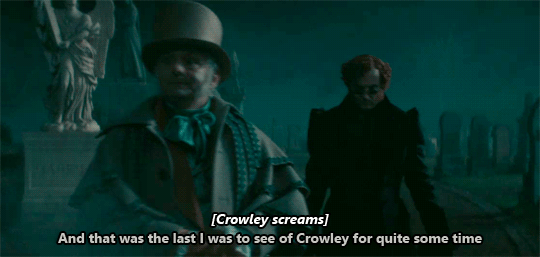
He fell in love with Crowley the moment he met the Starmaker. Even then, he warned Crowley of the dangers of questioning God. Aziraphale has always just wanted Crowley to be okay, to be safe.

Think about it… Aziraphale met Crowley Pre-fall. Aziraphale wanted to keep Crowley safe even back then, “word to the wise,” and couldn’t protect him. He saw or heard about the Fall—one day Crowley was there, the next Aziraphale is hearing (or worse: watching) him be cast down to this new place full of unspeakable and terrifying horrors called Hell. Crowley’s fall was obviously traumatic for Crowley and the fandom does a wonderful job acknowledging that, but how traumatic is it to watch someone you love Fall? To be totally helpless in that scenario?
To watch this beautiful creature be cast out and labeled as unforgivable, to hear them accept that and start calling themselves unforgivable when you never thought they did anything to warrant a need for forgiveness in the first place. “I knew the Angel you were.” I know you didn’t deserve any of this.
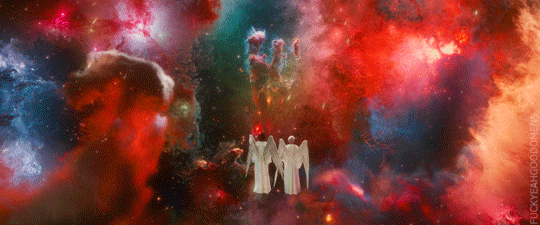

All he has ever wanted is for Crowley to be ok, to be safe. I read another meta where someone said Aziraphale purposely made the Bentley “our car” so Hell couldn’t pop in and grab Crowley anymore (property of an Angel + Shax couldn’t pop in anymore = safety), and told Crowley to watch the bookshop since he’s safe in there. Honestly I wouldn’t put it past Az to think that far ahead (he is intelligent and gayer than a tree full of monkeys on nitrous oxide).
These are a lot of half-baked ideas but I hope y’all see what I mean: Aziraphale wants Crowley safe because he has loved Crowley for 6,000 years, and in turn worried about Crowley for just as long. He just wants to take care of his love but the current systems of power in place make that utterly impossible and I think that breaks his heart every single day. I think the worry has been eating away at Aziraphale for 6,000—having such constant real and intense fear for your loved ones well-being is traumatic.
#So when the Metatron says Crowley can be an Angel and go with Az to Heaven?#Of course Az is excited#In his mind Heaven is still much better than hell#He hasn’t acknowledged the covert abuse/cruelties of heaven yet#He just sees the overt abuse of hell#And in a way#That’s so tragic too#He sees the opportunity for Crowley to leave hell but doesn’t realize it would be trading one prison for another#He’s hopelessly in love#And a GUARDIAN#He is a PROTECTOR#Of course his love language is keeping his loved ones safe#He’s just been so mind fucked by heaven that he doesn’t recognize what “safety” actually is#Good omens meta#aziraphale meta#good omens#aziraphale#go meta#aziraphale defense squad#aziraphale loves crowley#aziracrow#good omens angst#ineffable spouses#My post
112 notes
·
View notes
Text
there is something to be said for how much the Metatrons' offer of restoring Crowley to an angel changed things for Aziraphale, even beyond the face value of the offer
Azirphale eventually (and reluctantly) accepts the promotion under the presumption that he will be able to change heaven - "if I'm in charge, I can make a difference."
and obviously, Muriel and Jim/Gabriel are two key narrative players to show us why Aziraphale would think heaven can still be reformed - Muriel who was unbelievably lonely in heaven and, despite all their ineptitude, is so excited to experience earth for the first time (the fondness in Aziraphale's face during their scene together in the bookshop is so touching) - and Jim/Gabriel who Aziraphle once knew to be cold, unsympathetic, and remorseless but after having the memories and influences of heaven stripped away turns out to be helpful, curious, and self-sacrificing (we see Aziraphale come to terms with this change over the season, telling Jim in e2 that he's really not sure if he's still terrible but when Crowley is questioning Jim in e5, Aziraphale's sure he's just being silly)
but even after witnessing this, Azirphale isn't jumping at the offer to run heaven. He says so point blank, "I don't want to go back to heaven," but everything changes when he gets the offer to restore Crowley as an angel
and clearly, Aziraphale is so excited by the face-value offer, he and Crowley would be safe and they'd be together, and Crowley would never be punished for doing good again. Just look at his happy little hands when he's asking Crowley to pause his confession so he can share his own great news. He's beyond thrilled to be able to offer this to Crowley, to live this life with Crowley (before he realizes it's not a life that Crowley wants - those happy hands are devastating in hindsight)
so if bringing Crowley to heaven with him was the selling point, why is he still going after Crowley says no? Because in Aziraphale's eyes, the power to restore Crowley is the power to correct heaven's mistakes. So heaven can make mistakes - Aziraphale thinks the Metatron just admitted that heaven is fallible
that is HUGE
(this is also not what the Metatron was saying - but in this context what Metatron said doesn't matter, only what Aziraphale heard)
and this isn't just coming from some angel - the Metatron is the voice of God. The closest thing to speaking to God we have witnessed since 2500 BCE in the Job minisode (the most recent evidence of God speaking directly to a character). Regardless of where God actually is during this story, Azirphale would be taking the Metatron's word as the word of God
Aziraphale has been acting against what heaven says God wants since the beginning: giving away his sword in Eden to protect Adam and Eve from their punishment (which he then lies to God about but is still allowed to stay on Earth), lying to save Job's children and openly question God's role in the plan ("I… I don’t think… that is what God wants"), and of course stopping Armageddon with his Great Plan vs Ineffible Plan pedantry (and before this, his plan for most of s1 is to get in contact with someone higher than Gabriel because of course, God wouldn't actually want this) - and when he is finally found out, Gabriel and Michael cut his ties with heaven
but now might-as-well-be-God is walking into his bookshop and scolding the middle managers and saying they've been fucking up. And he tells Aziraphale that they were wrong about him and they were wrong about Crowley and Aziraphale's the one that's been in the right
(keep in mind that Aziraphale does not know that the Metatron has been on the same subcommittees as the archangels - after Michael and Uriel don't recognize him, he's probably assuming they have very little contact)
if Corwley falling was a mistake maybe everything else Aziraphale has been internally questioning is too. If heaven can make mistakes than something has been going wrong in heaven - a fault in operations not in design - there must something to fix
Aziraphale is a being of faith and he carries such guilt for questioning that faith. The idea that the Metraton is acknowledging a mistake must be such a balm to him
It's really no wonder he thinks he can change heaven after that offer
#good omens#good omens season 2#good omens meta#gos2 spoilers#aziraphale meta#obviously there are other things influincing his decision (esp his tendency to still fall into that heaven/hell binary)#also this is all manipulation by metatron#who just needs A and C sepparated#but I dont think metatron realizes what hes done by lighting this fire under As ass#Aziraphale is now a man with nothing to loose and everything to prove#and the metatron is going to end up regretting this
294 notes
·
View notes
Text
Crowley was a universe designer and Aziraphale was a people designer. The suddenly-obvious implications of this are wrinkling my brain.
#good omens#anthony j crowley#aziraphale#crowley x aziraphale#ineffible husbands#good omens s2#aziraphale meta#crowley meta#good omens season 2#good omens s2 spoilers
73 notes
·
View notes
Text


just putting the thought out there that people may disagree with; aziraphale is not in the same place that he was at the beginning of s1. originally, he held the bookshop near and dear for a number of reasons, but dominant amongst them being possibly because it is his own safe harbour, something that is intrinsically his, a literal sanctuary for him to delight in the other earthly pleasures that he loves.
s2 aziraphale is not in that same place; not because the bookshop means nothing, but because something else - someone else - means more. he doesn't catch crowley's meaning, what the bookshop means both literally and metaphorically to crowley, but he instead thinks that crowley thinks that the bookshop is still the most valuable thing aziraphale has.
but to aziraphale now, compared to when he was faced with the threat of losing it to armageddon, the bookshop was never going to last forever, but they could. they could last forever. if he has crowley, everything else can wither away, it means nothing, because crowley means everything.
443 notes
·
View notes
Text
It was actually rather hard to decide how to begin this meta post because there are essentially going to be two main parts: why Crowley does not actually avoid/run from his problems and why "going off" is not a bad thing regardless.
Then I wrote the first part and realised this is now 2.5k words long, so uhhhh I will grant part 2 its own post.
With that, welcome back to Alex's today-not-unhinged meta corner!
I am going to approach this topic from a psychological angle, which a lot of people have already done, but without explicitly mentioning it or going into depth. All my information comes from personal experience, research, my therapist, and my psychiatrist, just so you know I am not making shit up. I actually dug up some resources my therapist gave me a while ago.
Generally, there are four different fear/survival responses: fight, flight, freeze, and fawn. Most people have probably heard about fight and flight, since those two are usually the only ones that are mentioned/taught, so I will stick to explaining the other two.
"Fawning" refers to actively being submissive and subdued, both physically and emotionally. The goal is to appear non-threatening and to calm whoever is causing the fear response in the first place. It shows up as being overly agreeable, not having thoughts/opinions of your own and ignoring them if you do, your body language changing (e.g., making yourself smaller, taking up less space), and generally attempting to 'keep the peace' or reinstate it.
"Freezing" is pretty much exactly what it says on the tin—you freeze. It means slipping into a dissociative state, which disconnects you from your body, your emotions/mind, and/or the outside world. Usually, people stop being able to talk well or at all, they do not move, and if they do, it is on autopilot; you do not fight or flee, you simply exist until what is causing the fear response is over.
While dissociating, your brain is unable to form full memories—and depending on how heavily you are dissociating, it does not form any memories at all.
Freezing as a response happens when fight, flight, and fawn aren't possible anymore, e.g., a child who has no internal mechanisms to deal with large amounts of fear because it's a child, so the only way to escape the pain and aggressor is by fleeing into your mind and shutting down.
Why am I telling you all this? Because most people tend to have one or two survival responses that dominate/they usually fall back on, and the same goes for Aziraphale and Crowley.
When faced with an outside problem and a lot of stress, Aziraphale's first instinct is to fawn, to placate the person, to diffuse the situation, to make sure everyone is agreeing, or, at the very least, submitting to authority figures or aggressors. It is what heaven teaches them—stick to the rules, don't ask questions, do what you are told. If fawning involves lying, he will do so, here the need for safety is stronger than his desire to be truthful and stick to his morals.
Unfortunately, the fact that this is his primary fear response is also the reason behind his extreme cognitive dissonance. How can you stick to the rules when you do not know what the rules ARE? So he is stuck trying to figure out what is "good" and what is "bad" so he can be a good angel and avoid doing anything that might be seen as bad or disobedient.
His secondary response to stress or fear is to fight—once it's clear that fawning won't work, he can and will switch over to being more direct and aggressive/less submissive. We see that happening when he gets discorporated in season 1 and needs to get back to earth, at the airbase, or when the bookshop gets attacked.
If I were to ask you what you think Crowley's primary fear response is, how would you respond?
Well, if you said "flight"—you're wrong, and I will explain why.
Flight is his secondary fear response, it is what he falls back on in absolute emergencies when everything is doomed and there's nothing he can do anymore.
Before that, though, he fights.
Even as an angel, he was already questioning the system, he was ready to go and tell God she was doing a terrible job, that her ideas were bad, that he wants to keep his stars and the universe— six thousand years are nothing! If you actively oppose existing rules and defy people's authority over you, fighting is the only option you have unless you plan on giving up or the response becomes too much to deal with.
Fear itself happens when you or someone/something you love is being threatened (whether that threat is real or simply perceived as such doesn't matter), plus there are a large number of more irrational fears.
Crowley's creations were threatened -> He goes against the rules, he wants to fight for them.
On the walls of Eden, he questions God and talks to an angel, his hereditary enemy, once again defying the rules, questioning them.
Job and his children were threatened -> He goes against orders to try and save them.
There is good reason to believe he went against God by saving some of the children from the flood.
He showed Jesus the kingdoms of the world—do we really think that was based on orders? No, it was once again Crowley not playing by the rules.
Wessex? He proposes the Arrangement, which is one gigantic "fuck you" in his fight against celestial rules. Everything after that goes back to Crowley knowing that their jobs suck and that they can cheat, fight the system by working together. In 1827, it gets him pulled to hell and punished, and yet he does not stop; he keeps fighting.
Crowley is the one who immediately tries to stop the apocalypse. Aziraphale needs to be talked into it, needs to be convinced with selfish reasons and personal pleasure.
The reason why both heaven and hell absolutely loathe him is not because he is a runner; it's because he constantly and consistently defies them. He fights.
In season two, he immediately tries to deal with the Gabriel problem while Aziraphale is standing behind him and saying "I don't know" to all of his questions. Taking him somewhere so they can figure shit out in peace is not 'running'—it's smart. Sure, it's far from ideal, but we see what keeping him in the bookshop brought them, don't we? The hiding miracle is what tipped heaven and hell off in the first place.
Aziraphale goes to Edinburgh based on a hunch, but once again—did that help? Did his journalist roleplay trip actually provide vital information that solved a single puzzle piece of that mess? No. Finding out that Gabriel was at that pub with some mystery person was a nice fact to know, but that's it.
During the ball, Crowley is scared, vigilant, prowling around the shop, checking windows, telling Aziraphale to "stop this charade" so they can figure out what to do. Aziraphale, in that moment, was already convinced that sticking to the rules would save them—a heavenly embassy on a technicality, surely the group of fallen angels who got booted due to not following heaven's rules will respect that.
Crowley goes to heaven, which is once again him actively looking for a solution, while Aziraphale also falls back on fighting because fawning is not going to do shit.
There are three times during which Crowley suggests fleeing—which is his secondary fear response—but those are exceptions. Let's have a look at them.
The first one is at the bandstand, the evening before the Apocalypse, and since Aziraphale is lying to him, the situation seems hopeless to him. Yet he is still having his 'agents' look for him, is still fighting.
Do you know why he even suggests running? He is about to leave when Aziraphale calls him back with "there isn't anywhere to go," and now allow me to insert the following passage from the scriptbook.
Crowley looks back. He looks at Aziraphale. Above them, a beautiful starry sky. And Crowley softens.
"Big universe. Even if this all ends up in a puddle of burning goo, we could go off together."
The sentence in the show is slightly different, but they have one thing in common: If.
IF the world ends, we can still leave and be together. IF.
Crowley is NOT saying "let's leave", he is presenting Aziraphale with a contingency plan in case stopping the Apocalypse does not work. He is NOT running, he isn't even SUGGESTING to run.
It's a "if the world ends, we can be together. We don't need to be with hell or heaven; we can be in the stars," because remember what the end of the world would mean?
Eternal torture for Crowley while Aziraphale bores himself to death in heaven.
The next time he suggests it again—when he stops Aziraphale on the street—several things have happened.
First, he did not leave. If he truly wanted to flee, he would have by now, but he didn't. He sits in a cinema waiting for the end: "Out of time. Out of hope," as Neil puts it. Then Hastur and Ligur show up on screen and tell him, 'You're dead meat, Crowley. You're bloody history. […] We're coming to collect you'.
We all know that means "eternal torture in hell," but if you're not convinced for some reason, have another snippet from the script book that did not make it into the show.
Dagon is speaking from the Bentley's radio while he drives towards the bookshop, saying that something has gone wrong and they're sure he has a 'perfectly reasonable explanation' for it. Once he gets out of the car, however, Dagon still keeps going and says the following:.
"Your explanation, and the circumstances that will accompany it, will provide a source of entertainment for all the damned of hell, Crowley. Because no matter what agonies the damned are suffering, Crowley, you will have it worse."
Crowley already knows that. He has been punished by them before, heard, seen, lived torture, there is no doubt as to what will happen should they catch him. So he does what any person with a single fucking brain cell would do—he tries to get his loved one and FLEE.
Flight is the best response in this situation, and if you need me to explain why, then honestly, I cannot help you anymore. I won't go into detail about Aziraphale's response, but, tl;dr, it was shitty and incredibly hurtful, go figure.
Now, let's get to situation number 3, which is his speech during the final fifteen. We do not have an official script for that, but someone did make transcriptions for all episodes; you can find them here. Additionally, I will copy some of what I already said in a different meta post.
Crowley, stuck in his trauma-induced hypervigilance and paranoia, suggests putting as much distance between them and the problem as possible. I think it is interesting that in ep1 he wants to get Gabriel away from them, while at the end of the season, he is ready to get them away from the problem.
So far, I have never seen anyone mention that change! And it’s important! The entire season, it is hammered into our heads how much they love being on earth. It is THEIR bookshop and THEIR car and THEIR life.

Crowley wants to protect that home, and Gabriel is a threat to it, a threat to both of them, their life, the bookshop—everything. He does not want to leave, he wants his peace and angel in one place.
Yet by allowing Gabriel to stay, Aziraphale destroyed the sense of comfort and safety Crowley had slowly developed over the last few decades. Heaven nipping down every now and then to check in with Aziraphale is very different from him sheltering the Supreme Archangel who is running from ‘something terrible’ without even asking if he’s alright with that.
Aziraphale calls it their bookshop, but he fundamentally still sees it as his space to govern and Crowley as a guest; he even calls it a 'heavenly embassy'.
After another horrible week and having his previously safe space violated by several different times and beings, Crowley is back to where he was before—without a home. That fragile existence broke apart, so he is standing in the heap of shards and telling Aziraphale 'I don’t feel safe here anymore, let’s leave’.
He lost his safe space, but he still has his safe person, his best and only friend, the person he loves. I doubt he cares where exactly they go as long as they’re together and it’s safe.
Returning to heaven—it is the one place Crowley cannot follow him to. It’s literally the worst option, he can’t go back, he won’t go back. So he invokes the bookshop again, if you don’t want to stay for me, stay for the bookshop, your books, your corner of existence that I thought we had carved out for ourselves.
There is a common error that people make regarding the timeline, which is assuming that during this conversation they are already aware of the impending apocalypse—but they aren't. Aziraphale himself has no clue, and while Crowley saw the conversation and trial, he does NOT know when it will happen. For all he knows, it could be tomorrow, could be in a thousand years, and, even if he had been given a date, I doubt they laid out all the details and how to stop it.
Considering that his original plan was "get drunk at the Ritz and then have us time," I don't think he knew literally anything about how or when to stop it. So no, Crowley does NOT suggest running away from earth and leaving it to die.
All he wants is some bloody peace and quiet where no demons, angels, or power-hungry floating heads can interrupt them. A space that is safe and theirs. There are also zero mentions of where he wants them to go; he is not talking about the stars or the universe. He wants to get away from where they currently are because heaven and hell show up uninvited whenever they please.
If your boss and ex-boss constantly kicked down your front door and stated their wish to torture you, would you stay there or would you move? Yeah.
This post got very long, but it was long overdue.
I am tired of seeing people call Crowley a callous coward who always runs away from his problems when he is the literal opposite. You take three sentences said under exceptional circumstances and apply them to Crowley as a whole, when it is nothing but his last ditch effort to keep himself and Aziraphale safe.
One last thing: If you come onto my post and start aggressively arguing about this, I will block you. Genuine discussions and questions are always welcome, being a dick is not, and I also simply cannot handle some of the rhetoric people in this fandom perpetuate because it's very triggering.
Make your own post, don't do it on mine.
#alex talks good omens#good omens#ineffable husbands#good omens meta#crowley#aziraphale#good omens season 2#go2#aziracrow#crowley x aziraphale#ineffable divorce#the final fifteen#crowley meta#aziraphale meta#crowley deserves better treatment from this fandom#and people that actually remember canon and don't take some fanfic version of him they have created during the hiatus#so many straight up factually incorrect takes#i dont know if i will make it until season 3 guys
259 notes
·
View notes
Text
Good Omens Season 3: Heaven and Hell dividing humanity; humanity as Leviathan; and Aziraphale locking the doors of Heaven and throwing away the key [A Meta]
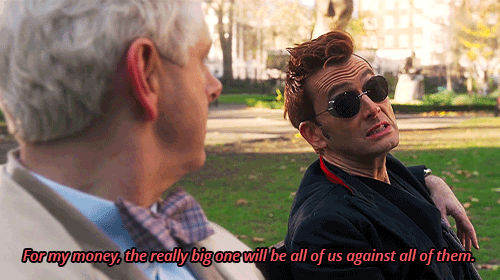
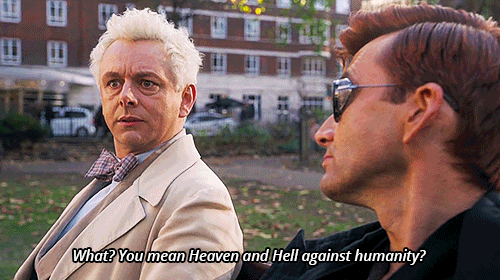
(This meta is long, but I swear there's some good stuff in here. It took me 2 months to get it together for these two longsuffering Anons. Thank you so much for asking me these very important questions.)
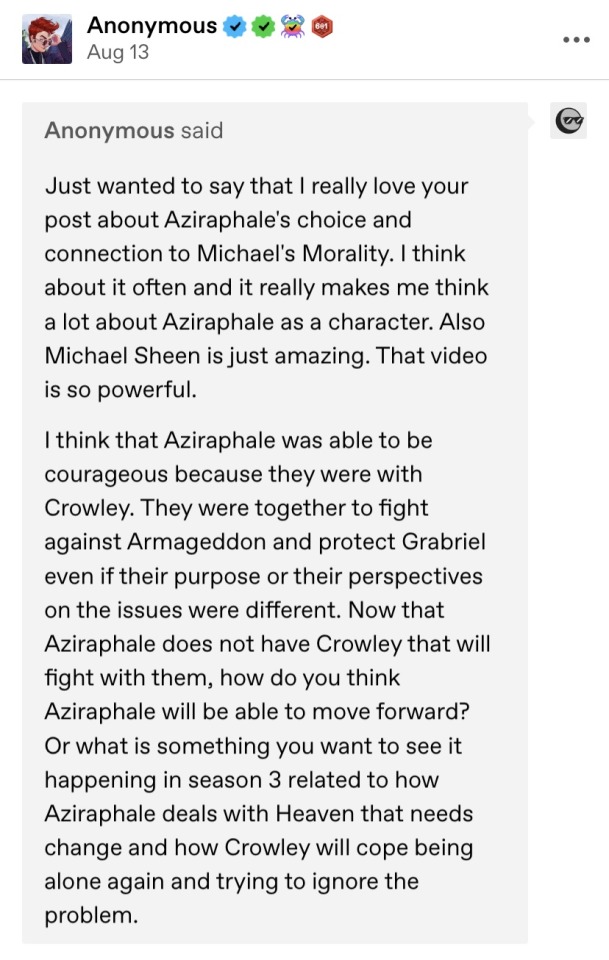

In preparation for answering two Asks above (and to aid my own predictions of Good Omens 3), I read and reviewed the Book of Revelation, W.B. Yeat’s iconic poem “The Second Coming,” Terry Pratchett’s Small Gods, Neil Gaiman’s deleted scene from American Gods (Shadow meeting Jesus in America), and Doctor Who showrunner Russell T Davies’ 2003 miniseries The Second Coming (starring Christopher Eccleston!). The first two are definitely going to be referenced in season 3, Davies’ show is one of the few stories dealing head-on with the coming of Christ, and Terry and Neil’s bibliographies are probably the biggest resources for how Season 3 will shake out thematically.
🕊 How Aziraphale Will Change Heaven
I think GO s3 is the season we see Aziraphale really come into his own, when we see him implement the moral vision he’s taken this long to coalesce, when all the pieces he and Crowley have put together are finally put on stage in a terrifying, beautiful display (all that righteous anger and conviction, merged with his kindness and empathy is going to be Something Else).
There’s an angel in the Book of Revelation who stands between the Earth and the Sea. This angel wears a rainbow halo and speaks with the voice of seven thunders, and yet John (the writer of Revelation) is told not to write down what this angel speaks. (Sounds like someone has hit on the Ineffable Plan?) If Neil and Terry were going to pick up an image from Revelation for Aziraphale, I really like this one, because it feels like an intermediary role (between two Sides), one that god dare not make public because it speaks an uncomfortable truth. And it’s about speaking and revealing knowledge, instead of fighting or destroying something.
Because even though we know Azi and Crowley will fight to stop the second End Times, fighting itself is not a theme Neil Gaiman or Terry Pratchett really champion. Instead of war, Aziraphale will oppose Heaven in all the little ways he and Crowley opposed it before: By enjoying human comforts (Azi will definitely bring food and trinkets to Heaven and send scrivener angels and seraphim alike to tour earth). By asking questions (Heaven’s new suggestion box). By telling stories about humanity and why it’s important to know who these humans are before anyone kills anybody (Azi was, after all, brought on board because of his human expertise).
Aziraphale will become what Crowley wanted to be before the Fall, but Azi’s got the benefit of thousands of years of knowledge, cunning, and intelligence about how both Heaven and humanity work. He knows Heaven’s weaknesses, he knows humanity’s strengths, he knows his own capabilities, and he knows where Heaven will turn a blind eye. He’s going to be such a bastard the likes of which we’ve never seen. And he’s going to drop truth bombs like there’s no tomorrow.
Season 2 brought back the book banter about “the lower you start, the more opportunities you have.”
Season 3 will bring back Aziraphale’s most badass book moment. This scene takes place after Azi possesses an American televangelist talking about the fire and brimstone of the End Times and the Rapture (the mass teleporting of all worthy believers to Heaven). Says Aziraphale,
youtube
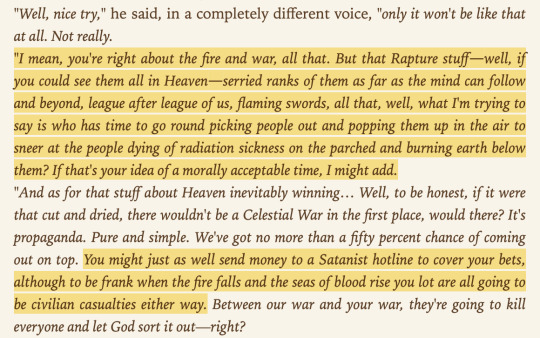
Aziraphale is fed up with Heaven’s hypocrisy and he's scathing in his condemnation of both Heaven and Hell. Everyone will die and become collateral damage, no matter which side is doing the killing.
Sound familiar?
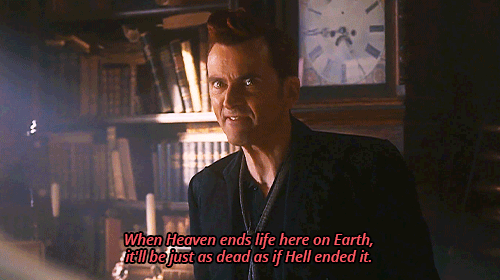
That's the arc Aziraphale is heading towards: that blazing conviction of Crowley's, spoken out loud and fearless and in spite of his eons of trauma. And Season 3 will see Aziraphale get to that place, where he gets to tell off Heaven, but not just in the privacy of the bookshop or the bandstand, but to their faces in Heaven's hallowed halls.
The demons and angels in Season 2 were much less icky and ethereal (respectively) from their appearances in Season 1. Because it's working towards a further humanization of both sides in Season 3. Because one of the biggest themes in s3 will be Aziraphale humanizing Heaven in all the little quaint ways he loves humanity. All in preparation for the endgame of Heaven and Hell not existing at all.
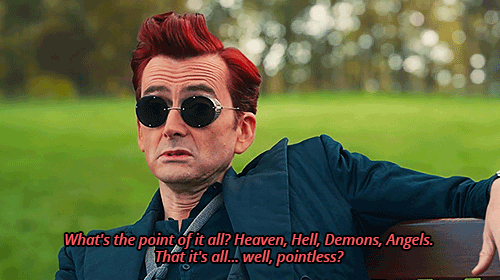
(Season 3 deep dive continues under the cut...)
Because angels and demons won’t be fought, but changed. Maybe not by much, but just enough to break the loyalty they have to a Great Plan no one understands. This is how both Neil’s American Gods and Terry’s Small Gods conclude, with the build-up to an incredible battle, and then for the human hero to step in and talk down the gods and armies into seeing sense and reason.
I don’t think Aziraphale himself will be that person. It might be a very human Jesus. Or (more likely) a random human being caught up in this craziness (maybe someone in Tadfield, per the working title of the second GO book: 668: The Neighbor of the Beast). But Aziraphale will be fundamental in changing the atmosphere of Heaven in the little ways Earth changed him.
🗝 Season 3 Themes: Morality and God
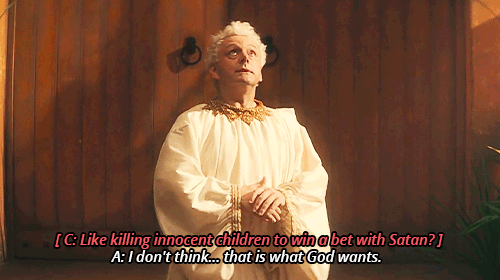
In the Job minisode, Aziraphale casually but boldly assumed that god didn’t want the goats and children to be killed. Because Aziraphale has a firm and dogged idea about what god should be. It’s his own personal morality, but he calls it god’s because he doesn’t want to imagine the symbol of ultimate goodness being anything other than what he Aziraphale himself feels to be true.
And I don’t think that’s a theme that Good Omens will deny for Aziraphale. Because it’s not really about how evil or good god is. It doesn’t matter what god thinks or is. god doesn’t answer questions, doesn’t deliver messages we can understand, doesn’t show up when needed. god is inscrutable, shifty, absent, “a Dealer who won’t tell you the rules, and who smiles all the time.”
What’s important is what humanity has done with god, what humanity has said about god, what they do in god’s name, what they interpret god to be. That’s the real danger.
And Aziraphale, in his profound goodness, will become the person he wants god to be. Because that’s the injunction we all have. To live up to the ideal we have made for ourselves: In many ways, that’s what god is.
Aziraphale is now in a privileged place that allows him to affect basically the entirety of Creation with that driving idealism. He will level the playing field in Heaven. I firmly believe Aziraphale will be the one to close the doors to the pearly gates and throw away the key.
So, like you asked Anon, will Aziraphale try to make Heaven better or stop the Second Coming? I think those are the same goal. Changing Heaven will fundamentally change how the Second Coming happens, because just like the End Times in Season 1, Heaven and Hell’s scheme will be turned on its head because the Chosen One refuses to follow the script.
The Second Coming will end, not with a bang, but a whimper, because everyone decides to turn in their guns and forget the whole thing.
⚔️ Heaven and Hell v. Humanity
But before that ending happens, I think there will be another threat the world has to face: the individuals who are so sure of their own righteousness that no amount of sense could stop them from destroying anyone who thinks differently. This is an important theme in both Neil and Terry’s works (see Vorbis, the Exquisitor in Small Gods, who tortured unbelievers for the Church), and I believe it will show up in the new season.
There's never been a true war that wasn't fought between two sets of people who were certain they were in the right. The really dangerous people believe they are doing whatever they are doing solely and only because it is without question the right thing to do. And that is what makes them dangerous.
–Neil Gaiman, American Gods
Because it’s humanity who takes Faith and shapes it into Religion. We are the ones who created the Heaven we see in GO: cold, unfeeling, strict, judgmental. And I think Season 3 is going to address this fundamental belief of both Neil and Terry: that humans are just so damnably human (fundamentally innocent and stupid and wonderful) and yet there’s a few of us who will take things too far and think that Someone wants them to destroy everything in the Name of God. And in these changing contemporary political times (the passage of an old generation, still clinging to their old ways and growing more extreme by the minute *cough*Trump*cough*), the dangerous people become even more vocal and violent, like the frightening, monstrous creature in WB Yeats’ poem “The Second Coming,” a devastating scourge on the world born in the name of God:
Surely some revelation is at hand;
Surely the Second Coming is at hand. […]
A shape with lion body and the head of a man,
A gaze blank and pitiless as the sun, […]
And what rough beast, its hour come round at last,
Slouches towards Bethlehem to be born?
–WB Yeats, "The Second Coming"
That’s who I think the Metatron will team up with in the end, someone like Vorbis. Because we’ve already seen how petty and small Heaven and Hell is, especially in Season 2. Only the Metatron really carries some heft and foreboding. I believe he’ll team up with some extremist faction of humanity who wants to see the End of Days and divide the world into Yours and Mine, with Heaven taking a portion and Hell taking a third and calling it a day. Not a War, but a divvying out of souls. With no consent or permission on the part of humanity.
That’s what I think the zombie reference is all about. Like Gabriel said in 2x03:
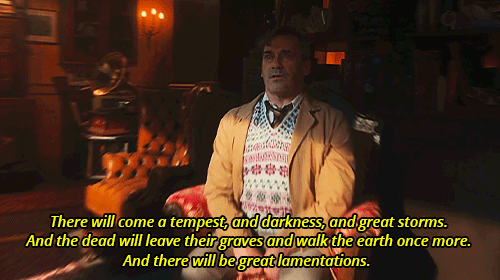
Yes, we’re going to get zombies. And it’s going to be insane and funny and horrifying (and I think we’ll get to know one or two historical figures who pop back up to earth). But the thematic and fundamental metaphor of zombies is how they have no free will. They’re not alive, they have no souls, they have no choices. That’s what Heaven and Hell want humanity to be: To do away with the dance of choice and free will and divide humanity once and for all between both sides. That’s how Heaven and Hell team up against the human race.
🐳 Leviathan (Job 41:19) as Humanity
And that’s how I believe the Leviathan fits in, who is the subject of the quote from Muriel’s matchbox:
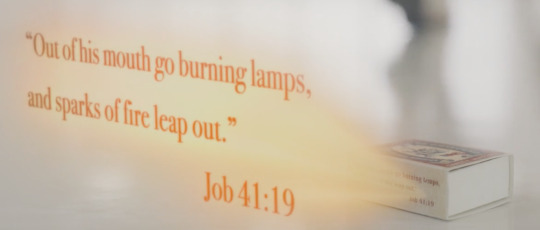
The Leviathan is a magnificent creature, and this passage goes on and on about how fearsome this being is:
Who can penetrate its double coat of armor? Who dares open the doors of its mouth, ringed about with fearsome teeth?… Nothing on earth is its equal—a creature without fear. It looks down on all that are haughty; it is king over all that are proud
–Job 41:13b, 33-34
And yet why does god want to explain how amazing the Leviathan is? To show how god has control of it. God says,
Can you pull in Leviathan with a fishhook… Can you make a pet of it like a bird or put it on a leash for the young women in your house?… Can you fill its hide with harpoons… No one is fierce enough to rouse it. Who then is able to stand against me?
–Job 41:1, 5, 7, 10
The reasoning is that because god created this dangerous and terrifying being, then god must be even more dangerous and terrifying. And if god can so easily abuse and humiliate this beautiful monster, then god must be worshipped and respected. (Yes, it’s as messed-up as it sounds.)
I can’t help but think of this Leviathan as a metaphor for humanity. A beautiful, ferocious being whose ownership and control is the focus of god’s attention and qualification for worship? Of the Leviathan, Job says: “Will traders barter for it? Will they divide it up among the merchants?” (Job 41:6). That’s how humanity is going to be treated in Season 3.
Because both God and Satan want to control humanity. They want to put their thumb on human souls and claim them for each side. But humanity doesn’t have to be so easily fooled, because we are more powerful than we realize. Our hearts and imaginations can forge a path of purpose and goodness without the entrapment of organized religion and fundamentalism. We, like Leviathan, are ferocious and angry and fed up with being treated like this. We can and will fight back.
🌟 Becoming Gods
Ultimately, we will shuffle off the need for Heaven and Hell (symbolized by the shutting down of both at the end of Season 3). We will lose the need to unquestionably defer to a Being who plays dice with our lives. I’m reminded of the opening passage to Terry’s Small Gods:
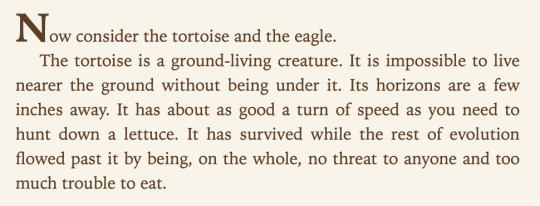
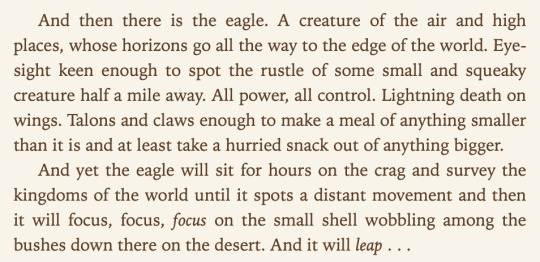
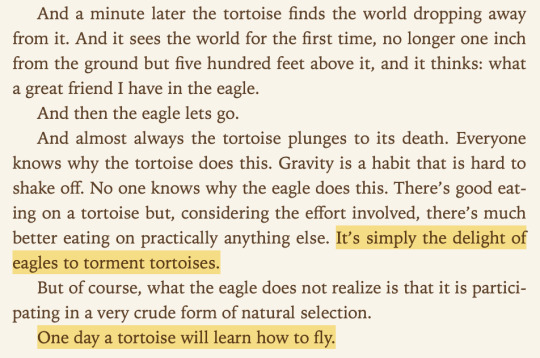
The lowly tortoise will learn to be the eagle; humanity will learn to be like god. Because we are as powerful as god, since we created god. Adam Young pointed out that having a god figure to solve all our problems doesn’t make humanity any more responsible for the evil things we’ve done. We need to learn that we are all we’ve got, and we have to answer for the shit we’ve done to each other and to the world.
I like how Russell T Davies put it in his show The Second Coming, where Jesus comes down again in the body of ordinary human Steven Baxter and tells humanity:
You are becoming gods. There's a new master of creation, and it's you! Unraveled DNA, and at the same time you're cultivating bacteria strong enough to kill every living thing! Do you think you are ready for that much power? You lot? You lot? Cheeky bastards. You're running around science like kids with guns, creating a new world, while the world you've got is stinking…. If you want the position of god then take the responsibility.
–Russell T Davies, The Second Coming
youtube
I legitimately think that’s how Jesus in Good Omens 3 will come down. In the body of a regular 30-something off-the-streets guy, who thinks the pomp and circumstance made about him is insane. And Aziraphale will be his minder, trying to tell him how the whole scheme is supposed to play out and giving him wise asides on how warped Heaven’s standards are and trying to tell him how to go about changing things for the better. (Jesus will be terribly confused, meanwhile; he just wants to go out for a pint and get on with his human life, none of this god business.)
🐍 Crowley’s Growth
There will be some big things at play in Season 3. I think Aziraphale will change how Heaven operates and close Heaven for good. I think Aziraphale will initially try to get Jesus on board with Azi’s own private mission of Goodness. I actually think Crowley will end up becoming Aziraphale’s “back channels” to Earth, and they’d exchange trite, bantering messages about the state of affairs from secret rendezvous points in America. (There was a whole thing about Jesus getting lost in Times Square, according to Neil Gaiman.)
I think Crowley will learn how to trust Aziraphale and learn that doing the right thing means being brave and selfless. He’ll realize that humanity is worth saving, even if it means dying. In fact, his depression at the start of Season 2 will probably only get worse after the loss of Aziraphale, and his altruism might get colored by the taint of suicidal recklessness, because he might as well go out for what he believes in, if what he wanted most in the world chose being selfless over being with him. (If Crowley’s character takes a suicidal turn like the Tenth Doctor after losing Rose, I’m gonna scream.)
This is how Aziraphale helps Crowley be brave in the finale of the Good Omens book. That’s what I think will happen in Good Omens 3:
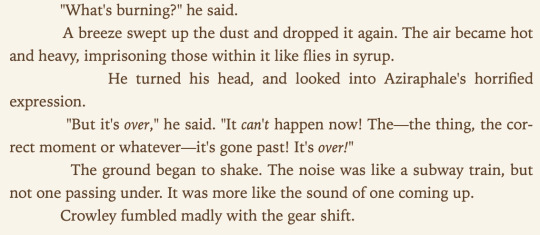
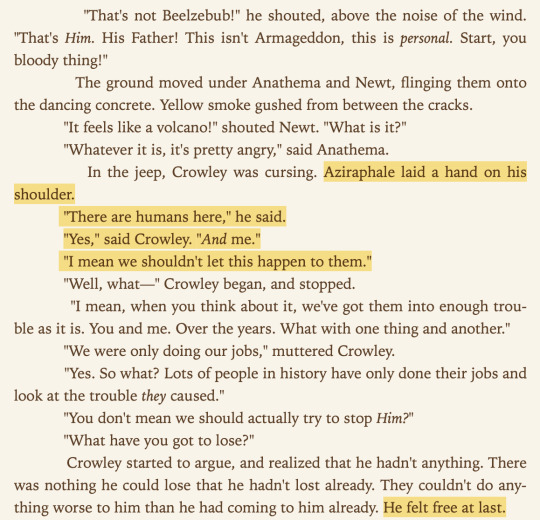
Aziraphale here displays a gentleness and kindness that comes from a place of grounded knowledge and responsibility. He knows how much he and Crowley have in their own ways fucked up humanity too, and he knows that no matter what their own personal feelings, they each need to do something to defend the human species they've come to love so much.
Crowley is scared of risking everything to help save humanity, but with Aziraphale's encouragement and wisdom, he realizes that doing the right thing is the only option he can choose, no matter the risk to his own happiness and safety.
So I believe Crowley will learn to understand why Aziraphale chose to return to Heaven and fight in the trenches. Crowley will see it as a choice made to save, not just each other, but the world they love so much.
Ultimately, I think Crowley on earth will take on Aziraphale’s strongest qualities: being selfless and bold to protect humanity at costs, and connecting to humanity on a personal, individual level.
While Aziraphale in Heaven will become like Crowley: asking questions, sabotaging the System, and condemning Heaven with all the uncomfortable truths they need to hear.
#good omens#good omens 2#good omens 3#ineffable husbands#aziracrow#crowley#aziraphale#good omens meta#good omens speculation#good omens 3 speculation#aziraphale meta#crowley meta#good omens 2 meta#good omens 3 meta#second coming#small gods#american gods#ask#anon#*mine#*mymeta#go meta#neil gaiman#terry pratchett
367 notes
·
View notes
Text
On the second watch through I am even more appreciative of the "compare and contrast" between Muriel's utterly transparent first attempt to blend in on earth, Aziraphale sitting there valiantly trying to keep a straight face
And showing us very shortly after that how much of the same excitement and naivety is still present in Aziraphale's "I'm a newspaperman!" act.
50 notes
·
View notes
Text
Imagining that the first time Crowley said "that doesn't sound like you, angel" Aziraphale was like. "He knows me"
No one else bothered to know his personality or true motives. He lied and hid in front of his superiors. So when he met Crowley, he was understood for once. He was seen. If you've ever had someone point out a little detail about you, you KNOW what I mean
Part of why I love the line changing from "enough of a bastard to be worth liking" to "enough of a bastard to be worth knowing"
He knows him
#he knows what he smells like too#ineffable husbands#quiet gentle and romantic#good omens#aziracrow#aziraphale#crowley#Aziraphale meta#aziraphale headcanons#good omens headcanons
229 notes
·
View notes
Text
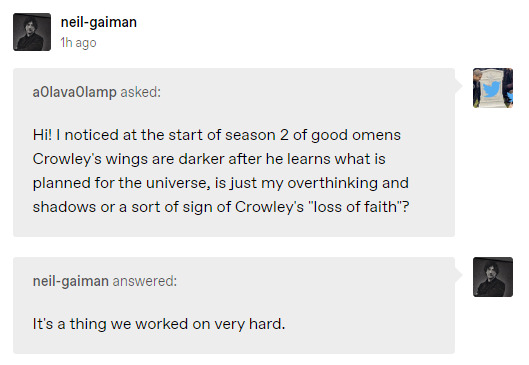
So, this response really got me thinking again and turning around some different gears in my head. Crowley's fall started with their meeting. That's huge!
This means Aziraphale caused Crowley to fall, at least indirectly and Aziraphale knows it.
I do quickly want to say that I feel it's likely Crowley would have fallen anyway, that it would have happened because of his nature and his curiosity and his questioning, but Aziraphale must remember that first meeting and blame himself for the eventual outcome. Here was this wonderful, joyful angel out there making nebulas and Aziraphale talked to him for like five minutes and he fell.
Because of Aziraphale.
It also recontextualizes some of Aziraphale's other actions if you think about the Guilt that Aziraphale must have been feeling. He's clearly smitten with Crowley when they first meet while Crowley's an angel, but on the wall at Eden, he's definitely more uncomfortable and his gazes aren't the longing looks from pre-creation. He recognizes Crowley as that angel, he feels guilty about it, far more than he does about giving away the flaming sword. And then when it starts to rain, he protects Crowley because it's the least he can do after what he did to ruin Crowley's life.
I'm betting he felt that same guilt very heavily when Crowley asks him for the Holy Water initially. He's afraid that Hell is so bad that Crowley would destroy himself to escape it. And though Aziraphale has clearly pushed his guilt mostly to the back of his mind, it has to be there in the forefront at that moment.
He's thinking "Crowley is suffering so much he'd rather be destroyed". He's remembering that beautiful, innocent angel Crowley was and how his laughter lit up the stars themselves and now Crowley asks him for the ability to end his existence. No wonder Aziraphale is so reluctant! If Crowley uses the Holy Water on himself, it means Aziraphale will be responsible for Crowley being completely destroyed. He only caves on the matter when he realizes Crowley will do it without his help and realizes he can't make Crowley suffer more to get it, not after everything he's already done to the demon so far.
I've always wondered why Aziraphale seems afraid of Crowley loving him. He's always seemed comfortable in the knowledge that he loves Crowley, but when Crowley tries to confess to him in the S2 finale, he looks terrified. He looks like he's about to have an anxiety attack.
It's not because he doesn't want to be loved by Crowley. He wants that more than anything. It's because this is the /wrong time/. But it was - in Aziraphale's head - so close to being the right time. In Aziraphale's mind, he was so close to finally making up for this horrible thing he did to Crowley, that he could finally accept Crowley's love without this looming over him. It's not just about making Heaven worthy of Crowley, it's about making HIMSELF worthy of Crowley's love.
What Aziraphale doesn't realize is that Crowley has never blamed him. Never. He's just projecting his own guilt and then using it to bludgeon himself into thinking he's not good enough for Crowley. Aziraphale values Crowley more than he values himself, just like he trusts Crowley more than he trusts himself.
It makes me think a bit more on the concept of Grace in Catholicism, how sins must be cleansed to allow the Grace to flow through and fill the body. When you believe that you must be cleansed of sin to accept Grace, it's an easy jump to feel that you cannot also be worthy of love if you have not absolved yourself of sin. But in Aziraphale's mind, there is no way to fix what he did to Crowley. Until there is.
No wonder Aziraphale reacts so excitedly - and so desperately - to the thought of reinstating Crowley as an angel. Yes, he knows Crowley is more than worthy of being an angel, that he never SHOULD have fallen to begin with. But with this added context it's even worse… he blames himself for Crowley falling. Crowley was so happy as an angel and Aziraphale took that away from him. He sees reinstating Crowley both as the Right Thing to Do in a moral sense, but also as a way to finally absolve himself of this guilt he's undoubtedly carried since Crowley Fell.
Aziraphale is so blinded by his guilt and his need to absolve himself and make it right for Crowley that he completely fails to realize both that Crowley doesn't want what he's offering, but he also fails to realize that Crowley doesn't even blame him for the terrible thing he thinks he did. Crowley already loves him without condition.
Trying to make Crowley an angel again is the most tragically selfish, self-centered thing Aziraphale has ever done and even then it comes from a trauma he's been carrying since before the Beginning.
He keeps forgiving Crowley for things that don't need forgiveness, but what Aziraphale really needs - for both of their sakes - is to finally forgive himself.
97 notes
·
View notes